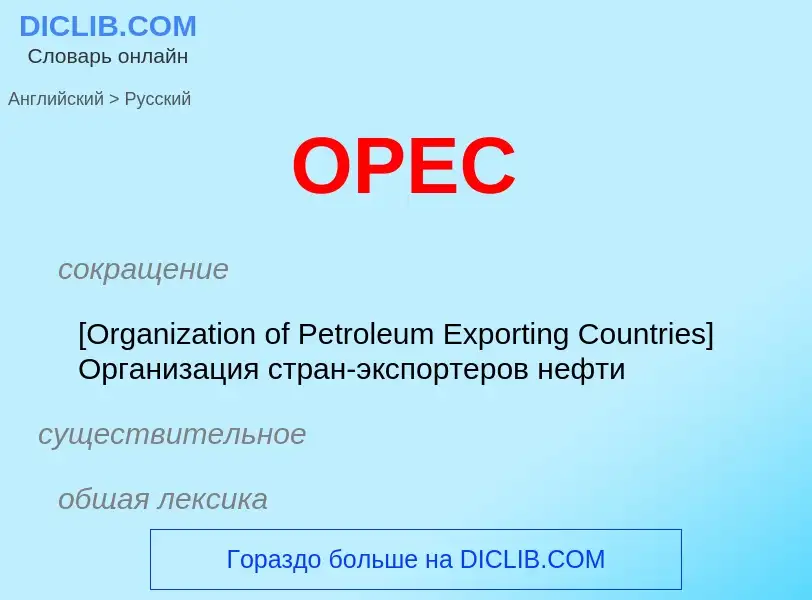Translation and analysis of words by ChatGPT artificial intelligence
On this page you can get a detailed analysis of a word or phrase, produced by the best artificial intelligence technology to date:
- how the word is used
- frequency of use
- it is used more often in oral or written speech
- word translation options
- usage examples (several phrases with translation)
- etymology
OPEC - translation to russian
сокращение
[Organization of Petroleum Exporting Countries] Организация стран-экспортеров нефти
существительное
общая лексика
Организация стран-экспортеров нефти, ОПЕК
синоним
нефтегазовая промышленность
Организация стран-экспортёров нефти
Wikipedia
The Organization of the Petroleum Exporting Countries (OPEC, OH-pek) is an organization enabling the co-operation of leading oil-producing countries, in order to collectively influence the global market and maximize profit. Founded on 14 September 1960 in Baghdad by the first five members (Iran, Iraq, Kuwait, Saudi Arabia, and Venezuela), it has, since 1965, been headquartered in Vienna, Austria, although Austria is not an OPEC member state. As of September 2018, the 13 member countries accounted for an estimated 44 percent of global oil production and 81.5 percent of the world's proven oil reserves, giving OPEC a major influence on global oil prices that were previously determined by the so-called "Seven Sisters" grouping of multinational oil companies.
The formation of OPEC marked a turning point toward national sovereignty over natural resources, and OPEC decisions have come to play a prominent role in the global oil market and international relations. The effect can be particularly strong when wars or civil disorders lead to extended interruptions in supply. In the 1970s, restrictions in oil production led to a dramatic rise in oil prices and in the revenue and wealth of OPEC, with long-lasting and far-reaching consequences for the global economy. In the 1980s, OPEC began setting production targets for its member nations; generally, when the targets are reduced, oil prices increase. This has occurred most recently from the organization's 2008 and 2016 decisions to trim oversupply.
Economists have characterized OPEC as a textbook example of a cartel that cooperates to reduce market competition, but one whose consultations are protected by the doctrine of state immunity under international law. In the 1960s and 1970s, OPEC successfully restructured the global oil production system so that decision-making authority and the vast majority of profits is in the hands of oil-producing countries. Since the 1980s, OPEC has had a limited impact on world oil supply and price stability, as there is frequent cheating by members on their commitments to one another, and as member commitments reflect what they would do even in the absence of OPEC.
Current OPEC members are Algeria, Angola, Equatorial Guinea, Gabon, Iran, Iraq, Kuwait, Libya, Nigeria, the Republic of the Congo, Saudi Arabia, the United Arab Emirates and Venezuela. Meanwhile, Ecuador, Indonesia and Qatar are former OPEC members. A larger group called OPEC+ was formed in late 2016 to have more control on the global crude oil market.

![OPEC Conference delegates at [[Swissotel]], [[Quito]], [[Ecuador]], December 2010 OPEC Conference delegates at [[Swissotel]], [[Quito]], [[Ecuador]], December 2010](https://commons.wikimedia.org/wiki/Special:FilePath/158ava Reunión de países miembros de la OPEP (5251965558).jpg?width=200)
 3.jpg?width=200)


![JODI]], in which OPEC is a founding member JODI]], in which OPEC is a founding member](https://commons.wikimedia.org/wiki/Special:FilePath/Jodi-circle-logo.png?width=200)

.png?width=200)


.jpg?width=200)
